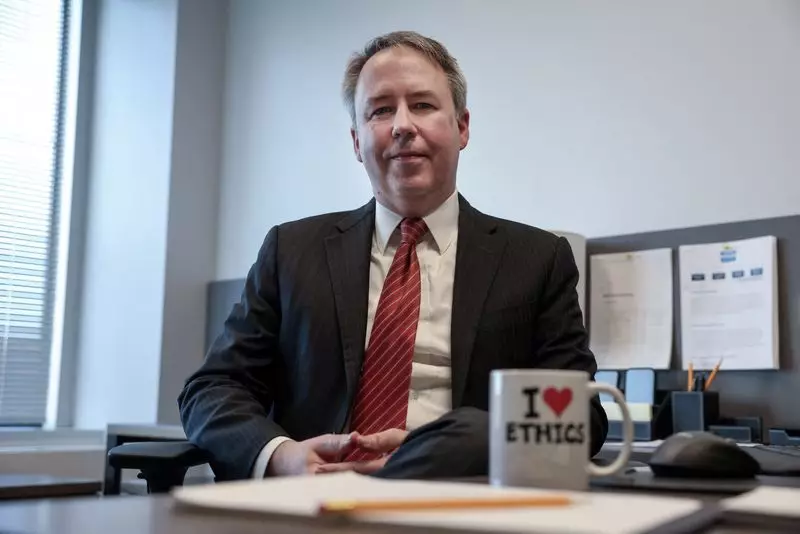In the landscape of American governance, the Office of Government Ethics (OGE) serves a critical function: to oversee and manage conflicts of interest among federal officials. As the U.S. braces for a new presidential administration, the scrutiny surrounding the OGE intensifies, particularly with the recent appointments made by President-elect Donald Trump. The appointment of David Huitema as the new director of the OGE brings to light the complex and often contentious relationship between personal interests and public trust in a political context.
Every presidential transition presents unique challenges, and the OGE is consistently in the spotlight during these crucial times. The recent remarks from Huitema underscore his understanding of the agency’s role in navigating the treacherous waters of ethics in government service. His predecessor, Walter Shaub, served a tumultuous tenure, which is a cautionary tale for Huitema. The expectation is not merely to maintain standards but to ensure transparency and accountability among a Cabinet filled with individuals who may have had contentious relations with regulatory frameworks in their previous roles.
Huitema’s long experience as the ethics chief at the U.S. State Department positions him uniquely to address the ongoing challenges presented by the incoming administration’s business entanglements, impacting not only Trump but also his advisors and nominees. The demand for rigorous evaluation of financial disclosures during this period is paramount, as mixed motives can threaten the foundational trust that supports democratic governance.
Financial Disclosure and Public Scrutiny
At the core of the OGE’s responsibilities lies the administration of the financial disclosure process for presidential nominees. Ensuring that these individuals fully disclose their financial interests is crucial in mitigating potential conflicts. Huitema highlights that nominees usually have a short window—five days after their nomination—to submit comprehensive financial disclosures. These reports not only elucidate potential conflicts but also provide valuable insights for the Senate and the public.
Transparency is vital; the expectation is that members of the public will actively participate in monitoring government officials by requesting access to these disclosures. Such engagement acts as a safeguard, reinforcing public awareness and involvement in the ethical standards upheld by their representatives. The overlap between government transparency and public accountability underscores the importance of the OGE’s work during transitions.
Conflict of Interest: Regulations and Enforcement
One of the more sensitive duties of the OGE involves dealing with instances of potential conflicts of interest that may surface as officials carry out their responsibilities. Huitema articulates the delicate balance between advising on ethical conduct and the legal implications of breaches in conduct. While criminal prosecution remains an ultimate sanction, guidance must come prior to any wrongdoing to foster an environment where ethical behavior is both encouraged and enforceable.
The OGE plays a crucial advisory role, working alongside agency officials to ensure compliance with ethics laws and to address any issues proactively. However, the efficacy of these measures can be hampered if the Department of Justice (DOJ) does not actively enforce ethical standards at the federal level—a predicament Huitema acknowledges.
At the crux of Huitema’s mission is a mission to restore faith in the integrity of governmental processes. As he has suggested, most career officials come equipped with a desire to act lawfully; the challenge lies in bridging the gap between private sector motivations and public service ethics. Sensitizing new officials to government ethics—a drastically different framework than what they may be accustomed to—will be crucial in establishing and maintaining integrity within government ranks.
Despite any cynicism that may permeate public sentiment regarding government ethics, Huitema believes that robust ethics training can play a central role in reshaping perceptions and reinforcing the social contract between leaders and citizens. For many coming into public service from the private sector, understanding the shift in expectations is vital to bridging the ethical divide that can arise.
As David Huitema prepares to take on the mantle of leading the OGE, the stakes could not be higher. The intersection of personal interests, public trust, and ethical governance will define his tenure and set the stage for how future administrations might navigate the complex landscape of government ethics. The success of Huitema and the OGE in maintaining ethical standards during this unprecedented time will serve as a litmus test for America’s democratic values in the face of challenges. The road ahead is fraught with obstacles, but the commitment to uphold the principles of integrity, transparency, and accountability remains crucial to the health of democracy itself.

